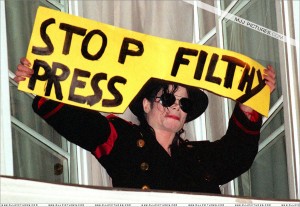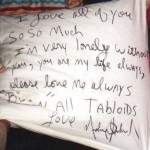Dangerous Michael: A Media-Made Stranger
♥PREFACE♥
“The Dangerous World Tour was the second worldwide concert tour by American superstar Michael Jackson as a solo artist, covering Europe, South America, Mexico and Asia from June 27, 1992 to November 11, 1993. The tour, sponsored by Pepsi-Cola, who also sponsored Jackson’s previous tour, included 69 concerts to 3.9 million fans. The tour grossed up approximately $125 million and all profits were donated to various charities including the new Heal the World Foundation that was set up by Jackson.
During the tour’s third leg in 1993, Jackson decided to end the tour due to, as he announced, illness which ultimately resulted in hospitalization. Jackson had become dependent on painkillers and suffered from dehydration, migraines, back aches, frequent ankle injuries and stress.” ~Wikipedia
♥♥♥
Michael was at the height of success in the midst of his record-breaking Dangerous World Tour when, in August 1993, false allegations of child molestation surfaced as part of a well crafted extortion plan.
After nearly four months of inflated gossip by the mainstream media and tabloid outlets, and disgusted by the allegations, Michael recorded a heartfelt and sincere statement from his Neverland Ranch in response to the defamatory manner in which their stories were being reported. His statement was televised worldwide on December 22, 1993. Michael said:
“At every opportunity, the media has dissected and manipulated these allegations to reach their own conclusions. I ask all of you to wait to hear the truth before you label or condemn me. Don’t treat me like a criminal because I am innocent.“
Since the early 1980′s Michael had consistently donated large sums of money to numerous children’s charities all over the world. This practice continued until the day he died. For more details on Michael’s humanitarian efforts over the years click here.
These efforts were grossly overlooked, in favor of the reportedly, more eccentric side of his personality and life circumstances. Throughout his entire solo career, MJ had a tenuous relationship with the media. In 1991, Why You Wanna Trip on Me, was released. This is a song, among many that Michael wrote, which addresses his early relationship to tabloid and mainstream reporting.
♥ Tribute video by rivieracar1992, posted on You Tube May, 2010. Producer creatively uses footage from This Is It.
Michael retreated from the public eye in late November 1993, in an attempt to regain stamina, and resolve a prescription drug dependency brought on by the overwhelming emotional stress of his unfairly damaged reputation. This resulted in the remainder of the two-year Dangerous World Tour being canceled. He released an audio statement to the press:
“I was humiliated, embarrassed, hurt and suffering great pain in my heart. The pressure resulting from these false allegations coupled with the incredible energy necessary for me to perform caused so much distress that it left me physically and emotionally exhausted. I became increasingly more dependent to the painkillers to get me through the days of the tour.”
 The tabloids, as well as mainstream media, offered no sympathy toward Michael, whose emotional and physical health was at risk. They continued instead to exploit him as the subject of taunts and ridicule. Once the allegations were in the public domain, the mainstream and tabloid media went on full attack:
The tabloids, as well as mainstream media, offered no sympathy toward Michael, whose emotional and physical health was at risk. They continued instead to exploit him as the subject of taunts and ridicule. Once the allegations were in the public domain, the mainstream and tabloid media went on full attack:
♥ Newsweek questioned “Is he Dangerous or Off the Wall?” on it’s cover page ~ September 6 1993.
♥ Time stated “Michael Jackson: Who’s Bad?” ~ September 6, 1993.
♥ The Daily Mirror held a “Spot the Jacko” contest offering readers a vacation to Disney World
♥News of the World ran the headline “Hunt for Jacko the Fugitive.”
♥ The Sunday Express headline read “Drug Treatment Star faces Life on the Run.
♥ The New York Post on it’s front-page declared “Peter Pan or Pervert?” ~ August 23 1993
The press continued their malicious coverage of Michael during the course of many years, succeeding in their creation of the caricature they dubbed “Wacko-Jacko,” previously known as Michael Jackson. In an interview with Barbara Walters in Paris 1997, Michael declared his dislike for the commonly used nickname. He said in the interview, “Wacko Jacko – where’d that come from? Some English tabloid…I have a heart, and I have feelings. I feel it when you do that to me. It’s not nice. Don’t do it. I’m not a ‘wacko’. I’m Jackson.”
Stranger in Moscow (song and video) was well-received and highly acclaimed by industry critics. The song was originally written by Michael, as a poem, in September 1993, in a hotel room in Moscow, just a month after the false allegations of child molestation broke during his Dangerous World Tour. It is perhaps one of Michael’s most personal songs, as his lyrics are direct and vulnerable. He was alone, outside of his home country away from family and friends during this shocking, and extremely emotional and physically taxing period. The opening verse of Stranger in Moscow speaks of isolation and despair. The verses refer to the unfair ridicule by the press.
In the chorus of Stranger in Moscow, Michael asks the listener a question that he has been asked many times, regarding his fame, fortune, talent and celebrity. He suggests that it all means nothing when you feel isolated, disconnected and alone. 
Over the years, Michael was continuously deemed a criminal, regardless of the fact that no court of law ever recognized that to be the case. After years of hugely celebrated success, Michael felt forsaken by the public. Through his song lyrics and occasional public interviews, he repeatedly asked the media to separate his celebrity persona, from his true self. He continually asked for privacy, and for the public and the media to understand that, behind his image, he was a man, worthy of respect simply by virtue of being a child of God.
Stranger in Moscow concludes with lyrics spoken in Russian. The lyrics, spoken by an unnamed individual, lend to the feeling of paranoia, despair, fear and isolation. Stranger in Moscow is a ballad about a man merely trying to have his voice heard, while by being crucified by the unjust lies and money hungry media machines.
Information sources:
* Campbell, Lisa D. Michael Jackson: The King of Pop’s Darkest Hour. Branden Books. 1994
* Halstead, Craig and Cadman, Chris. Michael Jackson: The Solo Years. Authors OnLine Ltd. 2003
* Jackson, Michael. “Stranger in Moscow” HIStory: Past, Present and Future, Book 1. Epic Records. 1996
“Stranger In Moscow”
I was wandering in the rain
Mask of life, feelin’ insane
Swift and sudden fall from grace
Sunny days seem far away
Kremlin’s shadow belittlin’ me
Stalin’s tomb won’t let me be
On and on and on it came
Wish the rain would just let me
How does it feel (How does it feel)
How does it feel
How does it feel
When you’re alone
And you’re cold inside
Here abandoned in my fame
Armageddon of the brain
KGB was doggin’ me
Take my name and just let me be
Then a beggar boy called my name
Happy days will drown the pain
On and on and on it came
And again, and again, and again…
Take my name and just let me be
How does it feel (How does it feel)
How does it feel
How does it feel
How does it feel
How does it feel (How does it feel now)
How does it feel
How does it feel
When you’re alone
And you’re cold inside
How does it feel (How does it feel)
REPEAT (above)
Like stranger in Moscow
Like stranger in Moscow
We’re talkin’ danger
We’re talkin’ danger, baby
Like stranger in Moscow
We’re talkin’ danger
We’re talkin’ danger, baby
Like stranger in Moscow
I’m live in lonely
I’m live in lonely, baby
Stranger in Moscow
[KGB interrogator - Russian to English Translation]
“Why have you come from the West?
Confess! To steal the great achievements of
the people, the accomplishments of the workers…”
Stranger in Moscow Behind the Scenes Footage: